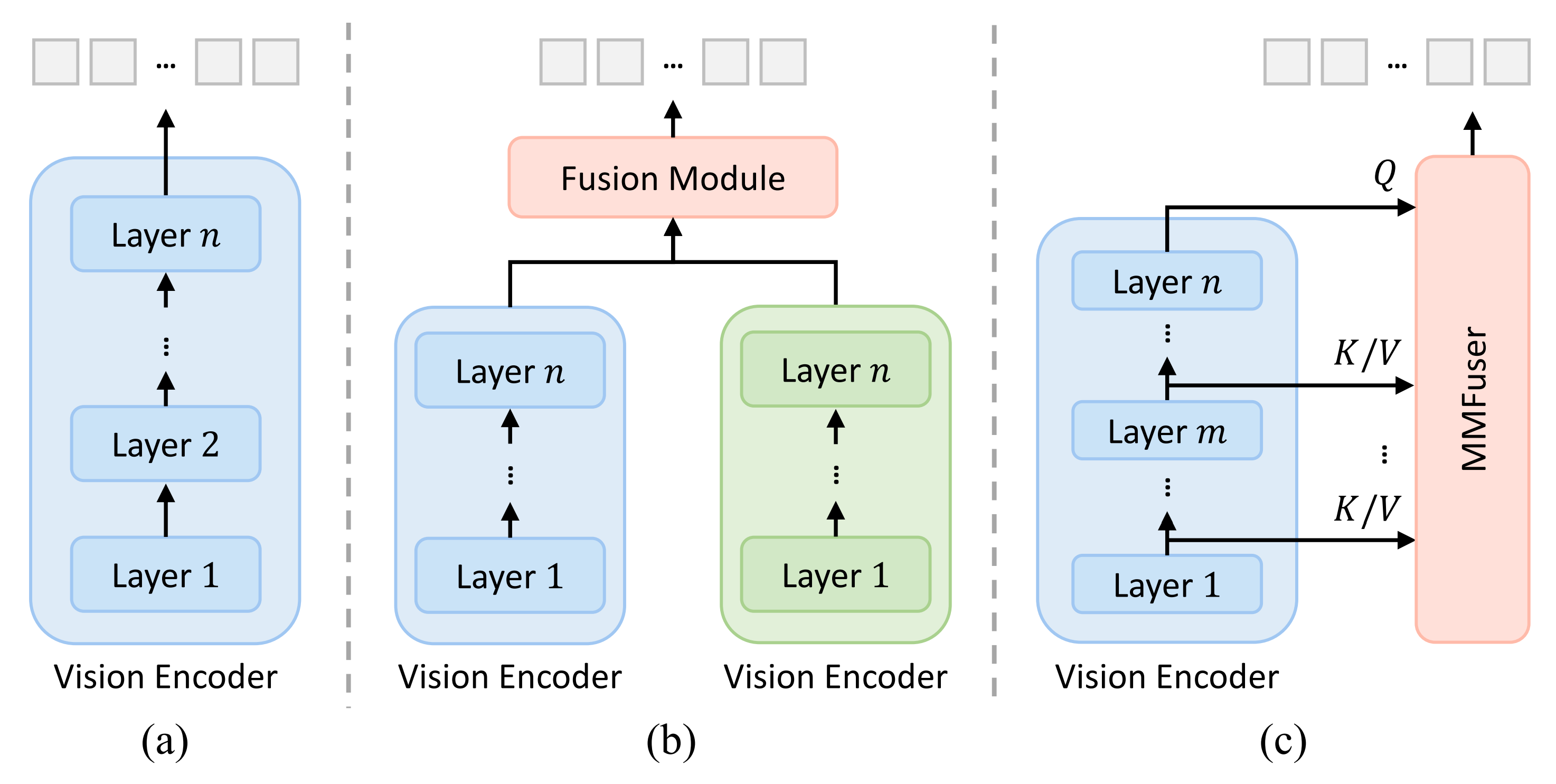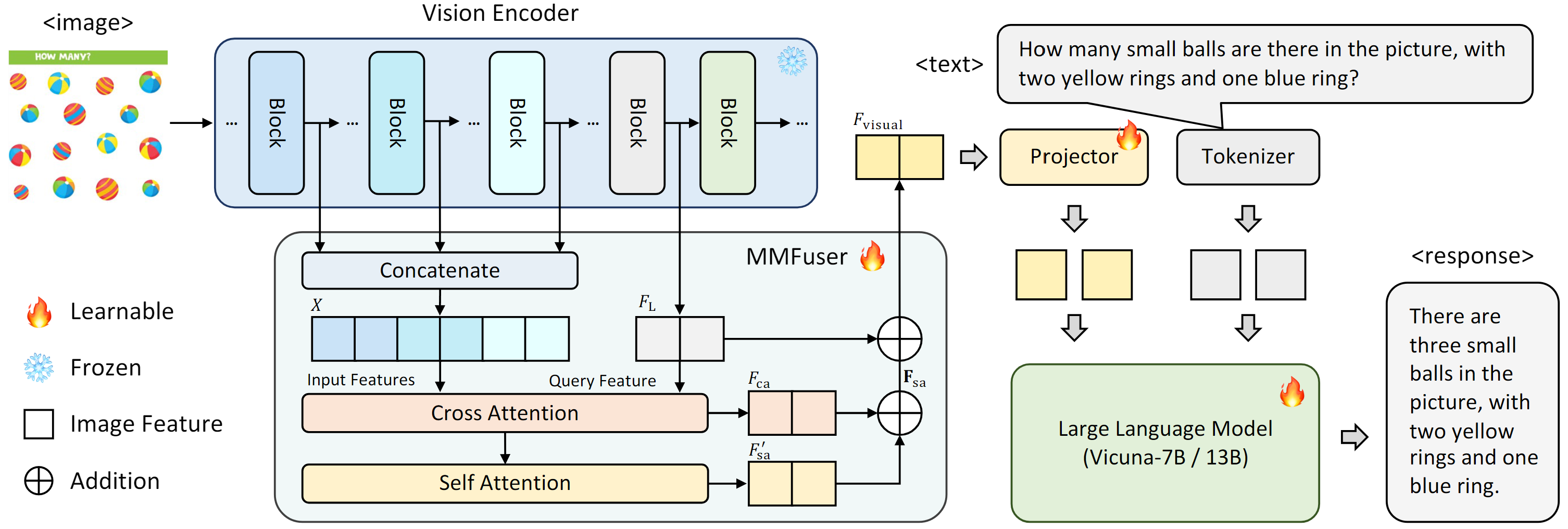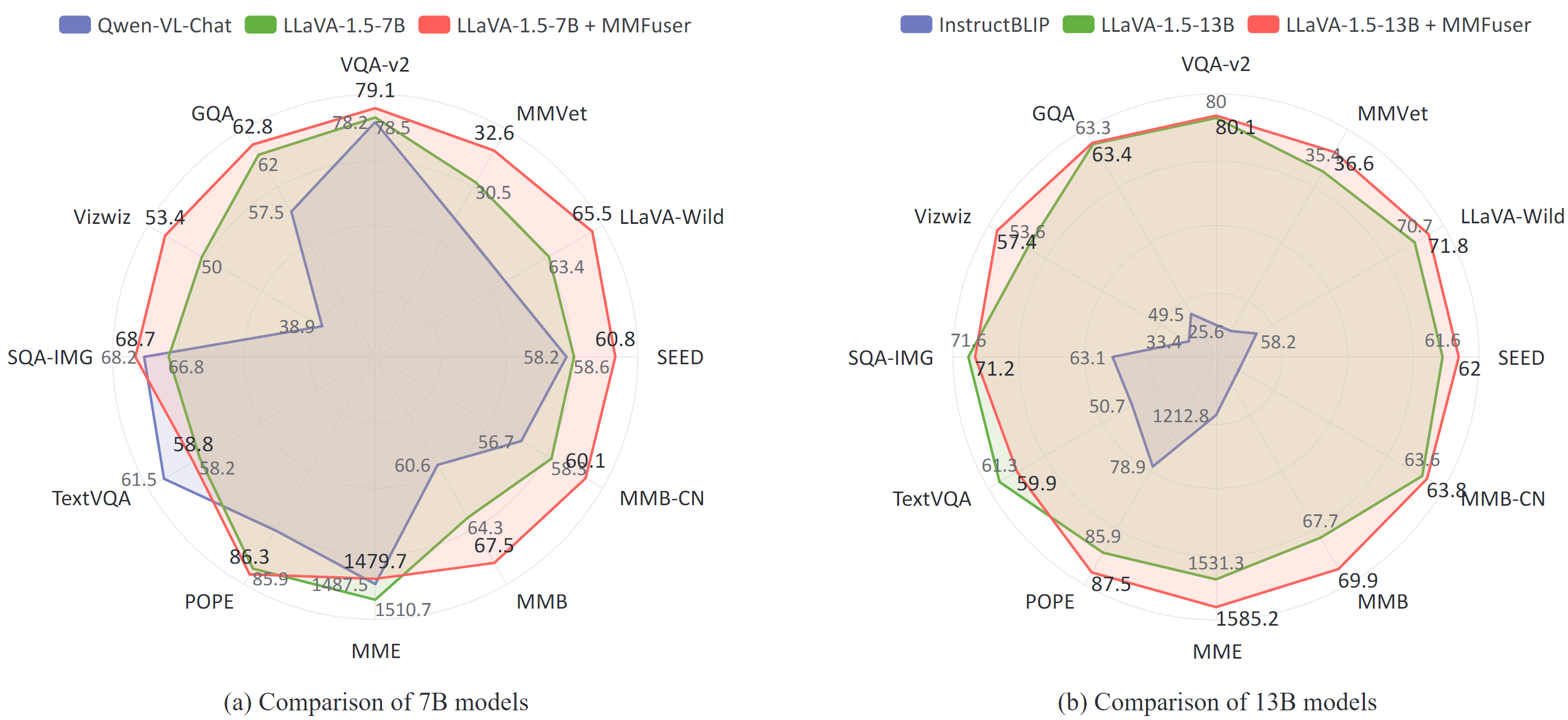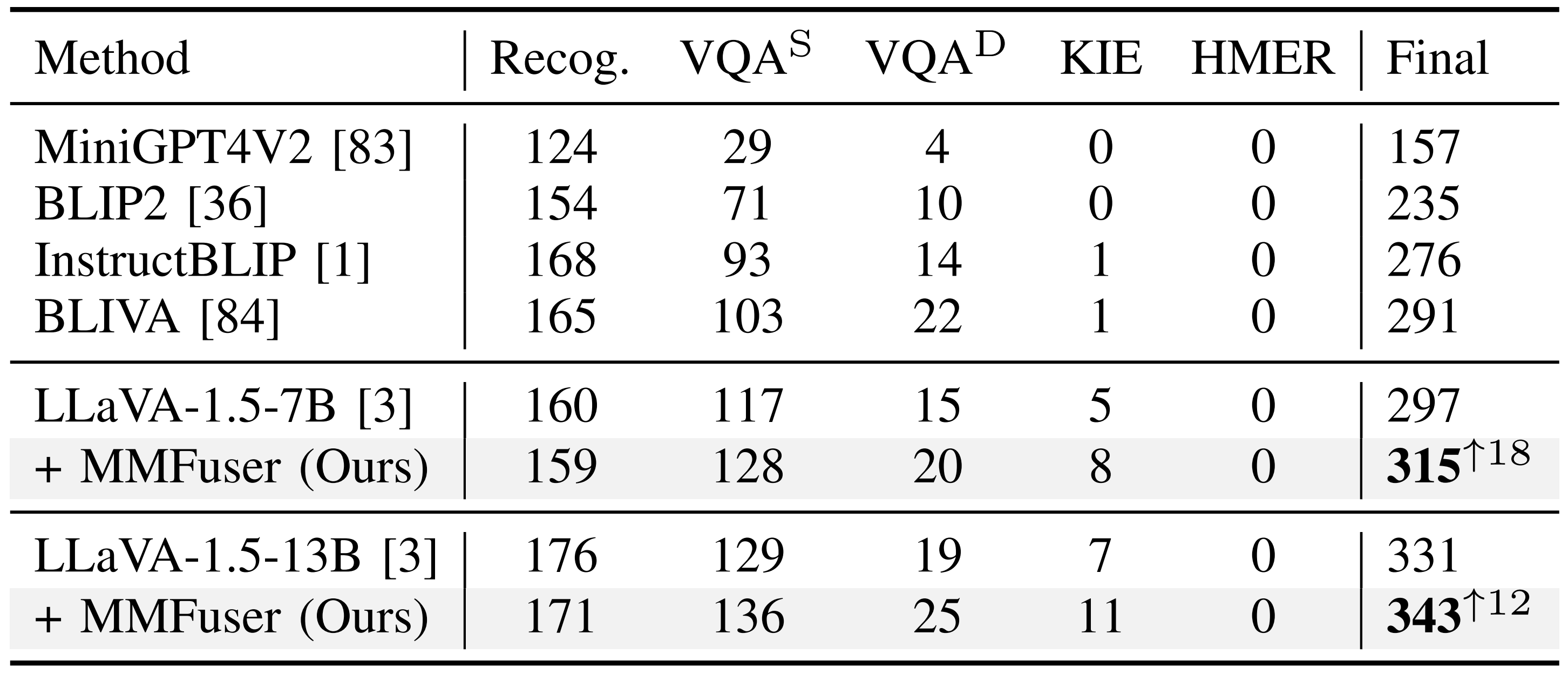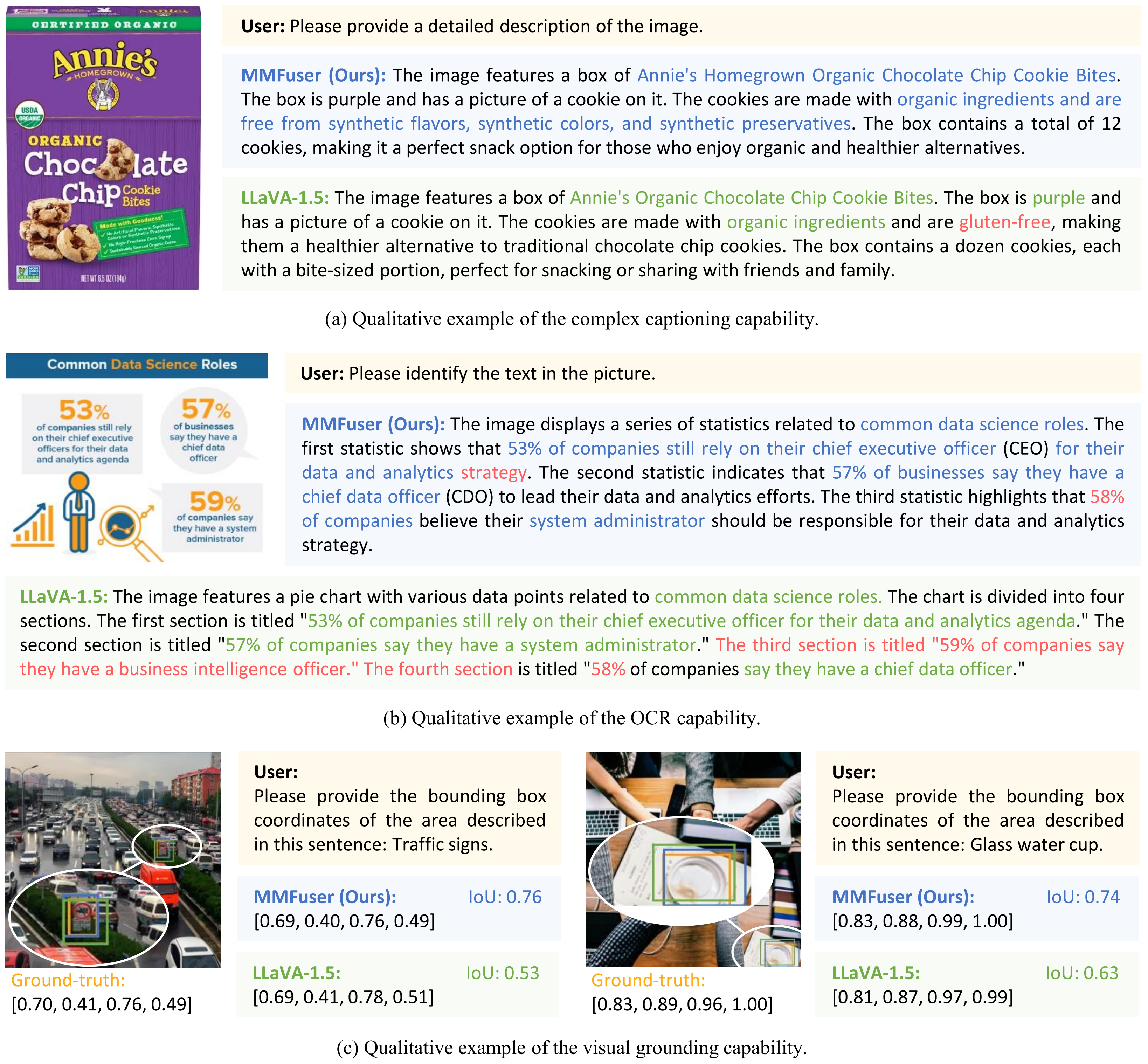English | 简体中文
The official implementation of the paper "MMFuser: Multimodal Multi-Layer Feature Fuser for Fine-Grained Vision-Language Understanding".
- [Oct 16, 2024] The paper has been released on arXiv!
- [May 30, 2024] 🔥🔥🔥 Code has been released.
Compared to the previous architecture: (a) CLIP only: Only a single layer of visual features is utilized, such as the second-to-last layer; (b) Hybrid: Integrate multiple visual encoders to enhance image representation; (c) MMFuser (Ours): Multi layer feature fusion module, used to process image features from different layers of the visual backbone (such as CLIP).
MMFuser is designed for Multi-modal Multi-layer feature fusion, which can enhance vision representation of MLLMs. The features from the last few layers of CLIP, while aligned with text, lack detailed information. In contrast, the output features from the shallow and intermediate layers contain more image details, but have poor semantic alignment.Therefore, our MMFuser employs the output features from the last layers of CLIP as queries (
Performance comparison of different model sizes. (left) Compared with 7B models including Qwen-VL-Chat, LLaVA-1.5-7B, our model achieves SoTA on 11 out of 12 benchmarks. (right) Compared with 13B models, including InstructBLIP, LLaVA-1.5-13B, our model achieves SoTA on 10 out of 12 benchmarks.
Comparison with state-of-the-art VLLMs on traditional VQA benchmarks and recent Multi-modal benchmarks. The best results are marked in bold, and the second best results are underlined.
After adding MMFuser, the performance of LLaVA-1.5 was greatly improved, surpassing LLaVA-1.5 on multiple benchmarks. Specifically, the scores on Vizwiz, MME and MMBench are 57.4, 1585.2 and 69.9, surpassing LLaVA-1.5 by 3.8, 53.9 and 2.2 points respectively.
OCRBench is a comprehensive OCR benchmark containing 1,000 manually curated and corrected OCR-related VQA instructions. As described in the table, our model has 7B and 13B parameters and achieves an average improvement of 15 points over LLaVA-1.5.
To assess regional understanding and grounding capabilities, we evaluate MMFuser on two representative regional-level tasks.
-
Results of Region Captioning On region captioning tasks, our model shows significant improvements. As shown in the table, compared to LLaVA-1.5, the 7B model of MMFuser surpasses LLaVA-1.5 by 2.5 points on average, while the 13B version improves by 3.9 points.
-
Results of Referring Expression Comprehension (REC) As shown in the table, our model consistently outperforms LLaVA-1.5 models across all benchmarks, with an especially notable average improvement of 5.7 points for the 7B model compared to LLaVA-1.5-7B.
To intuitively validate the impact of MMFuser on visual features, we present the input and output feature map visualizations for four example images in the figure.
-
Clone this repository and navigate to MMFuser folder
git clone git@github.com:yuecao0119/MMFuser.git cd MMFuser -
Install Package
Our project is based on LLaVA-1.5 and creates relevant environments according to LLaVA-1.5 Install.
conda create -n MMFuser python=3.10 -y conda activate MMFuser pip install --upgrade pip # enable PEP 660 support pip install -e .
-
Install additional packages
Flash-Attention is needed.
pip install -e ".[train]" pip install flash-attn==2.3.6 --no-build-isolationDeformation-Attention in Deformation-DETR is used in our Project. Run the following scripts to Compiling CUDA operators.
cd llava/model/multimodal_projector/deformable_attention/ops sh ./make.sh
Our training pipeline and datasets are directly borrowed from LLaVA-v1.5. The training consists of two stages:
- Pretraining: Train a projector on a subset of ~558K image-text pairs to connect a frozen pretrained vision encoder and a frozen LLM.
sh scripts/mmfuser/pertrain.sh
- Instruction Tuning: Fine tune the entire MLLM using multimodal instruction data LLaVA-665K.
sh scripts/mmfuser/finetune.sh
We follow LLaVA-v1.5 to conduct evaluations. you should download eval.zip and unzip it to ./playground/data/eval. Please refer to Evaluation.md to prepare the data.
Then, your can run our evaluation script in scripts/v1_5/eval.
And you can run inference with:
sh scripts/mmfuser/inference.sh- LLaVA: The codebase we built upon.
- The majority of this project is released under the Apache 2.0 license as found in the LICENSE file.
- The service is a research preview intended for non-commercial use only, subject to the model License of LLaMA and Terms of Use of the data generated by OpenAI. Please contact us if you find any potential violation.
If this work is helpful for your research, please consider citing the following BibTeX entry.
@article{cao2024mmfuser,
title={MMFuser: Multimodal Multi-Layer Feature Fuser for Fine-Grained Vision-Language Understanding},
author={Cao, Yue and Liu, Yangzhou and Chen, Zhe and Shi, Guangchen and Wang, Wenhai and Zhao, Danhuai and Lu, Tong},
journal={arXiv preprint arXiv:2410.11829},
year={2024}
}
